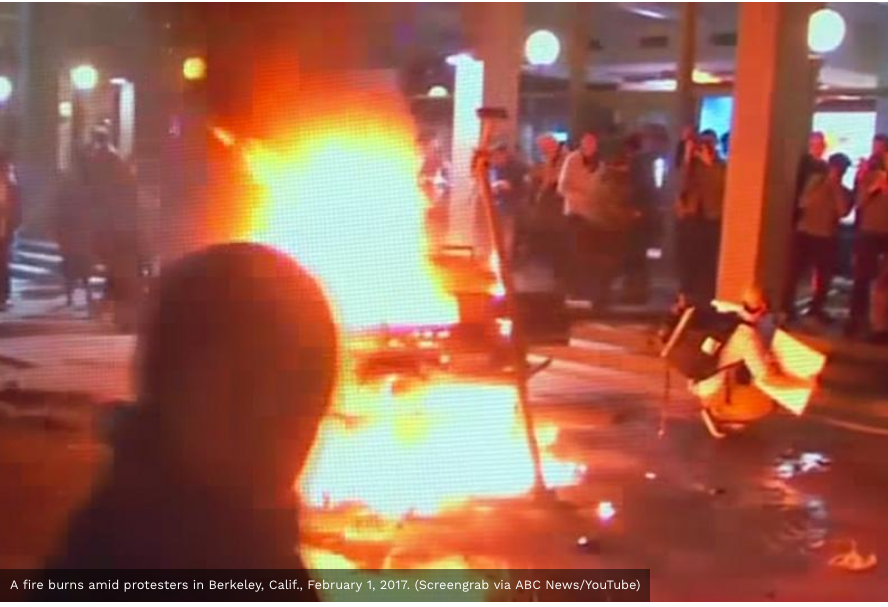In the United States of America, rioting to stop free speech is unlawful and reprehensible. Period. Full stop. It’s not “understandable.” It’s not excusable. There should be no tolerance and no sympathy for people who pepper-spray young women, beat bystanders senseless, and tear up property because they’re mad that another human being is speaking.
Last night’s spectacle in Berkeley, Calif., was disgraceful. In response to a planned speech by Breitbart’s Milo Yiannopoulos, a “peaceful” protest turned rapidly violent, and by late evening on the East Coast, television and Twitter were filling up with images of people and property being attacked by black-clad thugs, part of the so-called “black bloc” and “antifa” (anti-fascist) movements.
The visual evidence, however, can show how the media understates their size and their actual role in left-wing protest. Look at the image below, taken last night:


Law enforcement should prioritize identifying, locating, and arresting members of the black bloc, and it should treat them as the political terrorists they are.
You’ll note that I’ve said nothing about Yiannopoulos or what he believes — in spite of the fact that my family has been subjected to an avalanche of hate from the very alt-right that he defends. That’s intentional. For the purposes of protecting free speech, his views do not matter. There is nothing — nothing — that he has said that justifies or excuses this violence, and public officials in California should treat the rioters exactly as they would treat, say, the KKK if it rioted to shut down speech public officials liked.
Instead, we get tweets like these, from Berkeley’s mayor. Here’s his first, before the riot:
That’s an impressive amount of dangerous ignorance in one tweet. Speech can’t “silence” anyone. It might hurt feelings. It might make people angry. But it can’t “silence.” This is a common tactic of the hard Left. By equating speech with censorship, they justify their actual censorship as somehow “protecting” the community.
Oh, and it’s entirely improper for a public official to declare what kind of speech is or is not “welcome” in American communities. Or to place free expression in the entirely fictional (legally speaking) category of “hate speech.”
Later, when parts of his community were burning, he tweeted this:
That’s some pretty tepid stuff, Mr. Mayor. You can’t even muster half the outrage at beating and looting that you can at mean words? The mean words aren’t welcome in the town. Pepper-spraying women is “not the answer.”
Let’s move up the chain to California’s lieutenant governor, Gavin Newsom. He likes a little rabble-rousing. Read this pre-riot tweet:
His Twitter timeline is silent about the riots, but then Trump tweeted, questioning whether Berkeley should receive federal funding if it “does not allow free speech and practices violence on innocent people.” Well, that made Newsom really mad:
Rioters beat a man lying on the ground, and the threatened loss of taxpayer dollars is what’s appalling?
The thing that is so galling — and so destructive — is that we know that if the ideology of the rioters were flipped, if they were wearing #MAGA hats, the entire university world, the mainstream media, and every Democratic politician alive would be united in a full-throated declaration that the apocalypse was upon us, that “Trump’s America” was unequivocally a dark, violent, and hateful place.
As it is, we get nonsense like this, from a Washington Post news story:
While Trump framed his early morning tweet around free speech and opposition to violent demonstrations, his critics are likely to interpret the message as indirect support for Yiannopoulos, a polarizing figure who portrays himself as a champion of open expression. His detractors view him as a hatemonger.
Or this, discussing universities’ decisions to cancel Yiannopoulos’s events:
That leads some to argue that his speech is being censored. Others counter that universities aren’t required to pay security and other expenses when students invite speakers.
Dear Washington Post, there are actually binding legal precedents on this very issue. When public universities charge students prohibitive “insurance” or “security” fees as a condition of permitting controversial speech on campus, they break the law. Here’s the Supreme Court of the United States, in a 1992 case called Forsyth County v. Nationalist Movement: “Speech cannot be financially burdened, any more than it can be punished or banned, simply because it might offend a hostile mob.” So, yes, “some” do argue that prohibitive fees for controversial speech represent censorship. The “some” include justices of the Supreme Court.
If our nation can’t unite unequivocally and without reservation around the notion that rioting to stop free speech is reprehensible and unlawful regardless of the ideology of the speaker, we are not only losing respect for our core constitutional values, we’re losing respect for the rule of law itself. The unraveling continues, and every public official who dares to muster up more anger at free speech than at violence — or who equates free speech and violence — is doing his part to rip at the very fabric of our civil society.
— David French is a staff writer for National Review, a senior fellow at the National Review Institute, and an attorney.
 Listen Online
Listen Online Watch Online
Watch Online Find a Station in Your Area
Find a Station in Your Area








 Listen Now
Listen Now Watch Online
Watch Online
